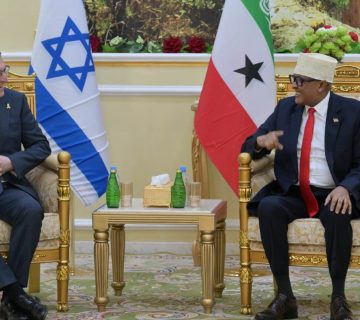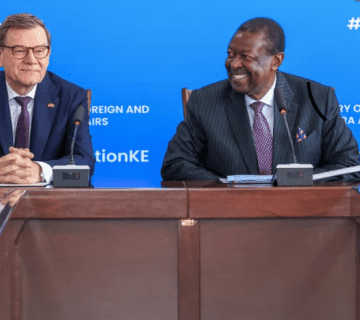After the deposal of the Sudanese president, Omar Bashir, on April 11, 2019, a transitional military council declared a two-year rule ahead of transition to civilian rule or ‘democracy’. The military coup, which short-changed the popular rebellion, came as an affront to the African Union Charter on Democracy and Governance, for being an unconstitutional change of government. On April 15, 2019, the African Union, through its Peace and Security Council, pronounced the regional spirit on the coup, handing the ruling military elite, a 15-day deadline which was later extended to three months, for transition to civilian rule. The African Union further threatened to suspend Sudan’s membership, if they failed to comply. However, the coup and the transition, are shrouded in a geopolitical reality, lurking beyond the eye.
The Middle East and North Africa Rival Powers
On April 16, 2019, a Saudi-Emirati delegation visited Sudan and held talks with the ruling military elite. On April 23, 2019, Egyptian president, Abdel Fattah al Sisi, organized a meeting of several African presidents in Cairo, and issued a three months deadline to the transitional military council of Sudan, to hand power over to civilian mandate. This deadline clashed, at least in principle, with the initial African Union position on the coup in Sudan, and the question is whether al Sisi, used his position as the AU Chairman, to influence AU’s position on Sudan, since the regional organ later extended its deadline to three months.
Ten (10) days after the coup, a coalition of Gulf nations comprising of United Arab Emirates (UAE) and Saudi Arabia, pledged USD 3 billion aid, USD 500 million cash injection into Sudan’s central bank to help in fiscal stabilization, and cheap supplies of food and medicine. The financial aid and supplies of food and medicine were to provide short-term relief to Sudan’s most pressing economic needs, which partly led to anti-government protests and al Bashir’s ouster.
However, Sudanese protesters publicly rejected the aid package, suspicious of Riyadh and Abu Dhabi’s motives, chanting at the military headquarters in Khartoum, “We don’t want Saudi support.” The protesters have now been chanting anti-Sisi slogans at the Egyptian embassy in Khartoum, rejecting Sisi’s interference in Sudan and telling him, “This is Sudan. Borders [with Egypt] stop at Aswan.” These events have exposed some Middle Eastern and North African powers angling for influence in post-Bashir Sudan.
On the other hand, another axis of geopolitical rivalry, features Turkey and Qatar, but more so, the former. It is worth noting, that Turkey had enjoyed long-time friendship with Sudan, at least since the pronouncement of Turkey’s foreign policy towards Africa, in 2005, and for their common position on Israel and Western influence in the Arabian Peninsula. Thus, a revolution or a coup against Bashir, and close ties between Sudan and the Gulf allies, UAE and Saudi Arabia, easily unsettles Ankara with fears of possible foreign policy change by Khartoum’s new rulers, and subsequent loss of influence across the Red Sea.
Vested Interests
The Gulf and North African allies, UAE, Saudi Arabia, and Egypt, are geopolitical rivals to the Turkey-Iran-Qatar axis. These countries seek to rope in proxy states in their rivalry as they struggle for regional influence in the Horn of Africa. To acquire the influence and secure alliances, these powers have been using their economic might to entice proxies with huge investment, trade, and defence ties.
The UAE, for instance, provided USD 2 billion worth of investment projects to Sudan in 2017, and her investments in the country are estimated to be around USD 3.5 billion. In 2014, Qatar pledged USD 1 billion cash injection into the Sudanese central bank, while Saudi Arabia had provided an estimate of about Saudi Riyals 8 billion to Sudan in terms of development loans, between 2015 and 2018. This saw Sudan join the Saudi-Emirati war in Yemen against the Houthi rebels in 2015, with at least 3,000 ground troops and several fighter jets, and is still involved in the war.
Turkey, on the other hand, secured the strategically located Suakin Island from Sudan, for ‘strategic development’, and signed 22 agreements providing for a new airport at Khartoum, a free-trade zone in Port Sudan, a port and shipyards for military and civilian ships on the Red Sea, grain silos, a university, a hospital, and electric power stations. The trade between Turkey and Sudan has been growing over years, from USD 153 million in 2005 to USD 234 million in 2018, with the overall goal of pushing it to USD 10 billion over five years, beginning 2017.
Change or Status Quo?
Sudan is in dire need of economic revival dependent on an increase in foreign investments, development aid and loans, and other fiscal measures, which will expand employment opportunities, stabilize the economy fiscally, and improve the cost of living for many Sudanese citizens. This may reduce internal political pressures. Thus, while Sudan ponders transition of power from the ruling transitional military council to the next civilian government, an inescapable strategic dilemma lingers on, brought by Sudan’s pre-coup foreign relations. So, the transition has to decide whether change or continuity of foreign policy will best secure Sudan’s economic revival and stability. This is in view of the fact that, due to the economic crisis and security challenges in Sudan, investment funds, aid, and defence ties from the Gulf, are as tempting to the transition process in Khartoum, as are thawing Sudan-United States relations and pre-coup Russian pledge of support. Ultimately, continuity in foreign policy might not necessarily mean, change in Sudanese politics.



